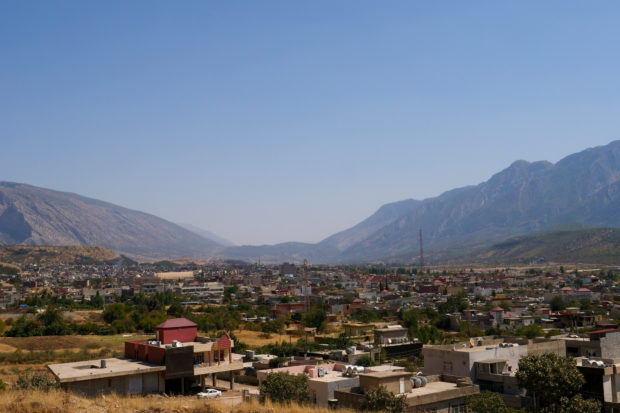In Iraq Kurdish town, many undertake smuggling route to Europe via Belarus

A view shows the town of Shiladze in Iraq’s Kurdistan region, Iraq September 22, 2021. REUTERS
SHILADZE, Iraq — Despite the risk of getting stranded in Europe or perishing on the way there, scores of people from a single town in Iraq’s Kurdish region have opted to be smuggled into European Union countries via Belarus, local smugglers and officials say.
One local Iraqi Kurdish smuggler said he had arranged the trip for about 200 people wishing to leave the town of Shiladze and the surrounding area – first legally by plane to the Belarusian capital Minsk, then illegally overland.
He said his business took off in the late spring of this year when the number of migrants trying to enter the EU from Belarus surged, though admitted it was upsetting that people had died trying to cross into EU countries.
“But they want to leave. What else can they do?” he said, asking not to be named.
An Iraqi migrant died last month after crossing into Poland from Belarus, one of a number of recent deaths in the border area coinciding with a surge in illegal migration across the EU’s eastern frontier.
Article continues after this advertisementPoland, Lithuania and the EU have accused Belarus of encouraging migrants, mostly from Iraq and Afghanistan, to cross their borders as a form of pressure on the bloc over sanctions Brussels has imposed on Minsk over human rights abuses.
Article continues after this advertisementShiladze, a town of some 40,000 people, is one of the major points of departure, according to local smugglers and residents.
The town lies in the relatively stable autonomous region of Iraqi Kurdistan. But problems such as low employment and pay, as well as geopolitical tension over Turkey’s military sorties inside Iraq against Iraq-based Kurdish militants, have long been pushing people to seek refuge – and a better life – in the West.
But the outflow has spiked since the Belarus route opened up, with migrants believing it offers a safer, faster way out.
The former Soviet republic is one of the rare destinations for which Iraqis easily get tourist visas. Once migrants reach Minsk by plane, their ongoing journey is handled usually by smugglers on the ground.
The Kurdistan regional government based in Erbil did not immediately respond to requests for comment. In Baghdad, Iraq’s interior ministry said human trafficking was a crime and that steps were taken when this occurred, but did not elaborate in a response to a request for comment.
$12,000 to be smuggled to EU
The Shiladze smuggler said his partner in Europe is a man he met in neighboring Turkey.
“I’ve helped about 200 people leave for Europe in the last five months,” he said, though it was not known whether all had made it to EU territory. He said he knew at least three other smugglers working in his area.
Local officials could not give specific figures on the number of migrants. A local journalist said it could be up to 400 from Shiladze and other towns in the region since the spring of this year, and numbers were increasing.
“Many of my relatives and friends have left that way. Many others want to do the same,” said Abdullah Omar, a 38-year-old barber. “People have sold their homes or cars to afford it.”
The trips can cost up to $12,000 including flights and being smuggled overland once in Europe, according to the smuggler and local travel agencies involved in booking the air travel.
Iraq suspended direct flights from Baghdad to Minsk in August under EU pressure. Migrants are now flying via Dubai or Turkey, according to smugglers, residents, travel agencies and the honorary Belarusian consul in Erbil.
Iraqi analyst Amin Faraj said that while Kurdistan is more stable and viewed as more prosperous than the rest of Iraq, an ongoing economic crisis which has seen authorities unable to pay public sector wages has put a strain on many ordinary Kurds.
Moreover, Shiladze residents live in a mountainous region near the Turkish border where security can be fragile. Turkey has carried out air strikes in northern Iraq against the Kurdish PKK militant group which uses the north as a base.
The Kurdish government said this year that the chronic conflict had “resulted in a rise in insecurity and forced thousands of residents from hundreds of villages to flee their homes and lose their livelihoods”.
“Our area is besieged, it’s in the hands of the PKK and the Turks. Our region is nice, but we are afraid and we don’t trust in staying here,” said Halkaft Mohammed, a Shiladze resident who added that his 19-year-old son reached Germany last month.
“Our villages are deserted, we can no longer go to the orchards,” said Ibrahim Mahmoud Ibrahim, a 27-year-old local security officer.
He gets paid $400 per month – a fairly standard Iraqi salary for his grade and said he is also considering migrating.
Aziz Abdullah, a shop owner and father of two, said he would migrate even if it meant ending up in a camp in Europe waiting for asylum status.
Abdullah sells wedding dresses in the town market but said he gets virtually no customers. “Why spend $10,000 USD on getting married, when you can spend it on getting out?”